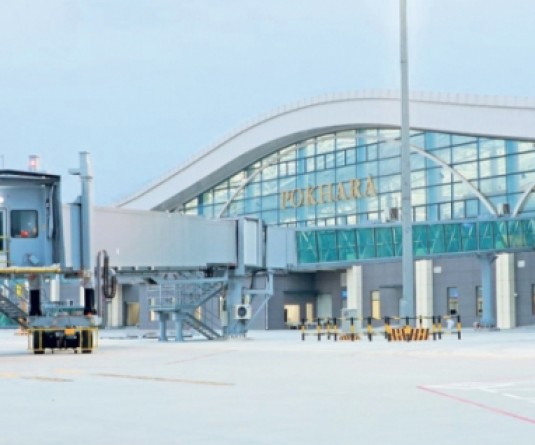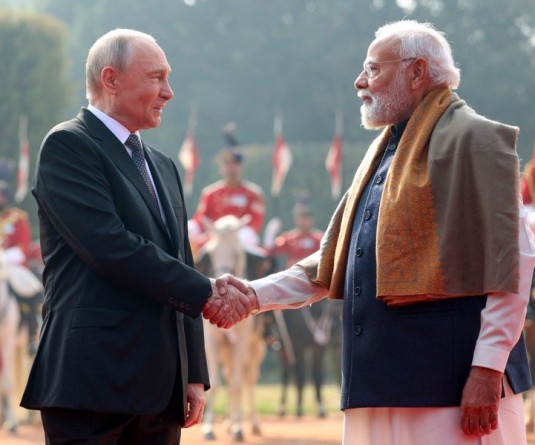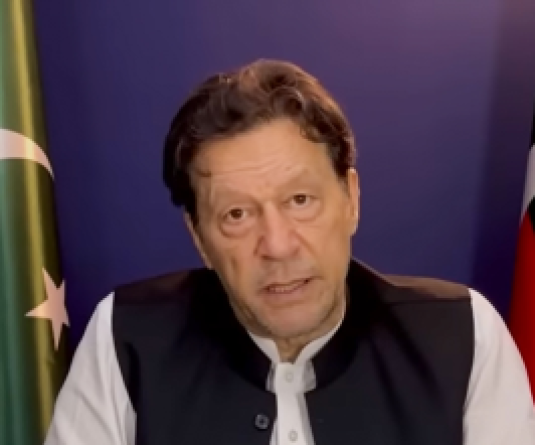
BREGA, Libya, March 3 (Reuters): Muammar Gaddafi's forces struck at rebel control of oil export hubs in Libya's east for a second day on Thursday as Arab states weighed a plan to end turmoil Washington said could make the nation "a giant Somalia". A leader of the uprising against Gaddafi's 41-year-old rule said he would reject any proposal for talks with Gaddafi to end the conflict in the world's 12th largest oil exporting nation.
Witnesses said a warplane bombed the eastern oil terminal town of Brega, a day after troops loyal to Gaddafi launched a ground and air attack on the town that was repulsed by rebels spearheading a popular revolt against his four-decade-old rule. The rebels, armed with rocket launchers, anti-aircraft guns and tanks, called on Wednesday for U.N.-backed air strikes on foreign mercenaries it said were fighting for Gaddafi.
Rebels called on Thursday for a no-fly zone, echoing a demand by Libya's deputy U.N. envoy, who now opposes Gaddafi. "Bring Bush! Make a no fly zone, bomb the planes," shouted soldier-turned-rebel Nasr Ali, referring to a no-fly zone imposed on Iraq in 1991 by then U.S. President George Bush. But perhaps mindful of a warning by Gaddafi that foreign intervention could cause "another Vietnam", Western officials expressed caution about any sort of military involvement including the imposition of a no-fly zone.
A rebel officer said government air strikes targeted the airport of Brega and a rebel position in the nearby town of Ajdabiyah, referring to two rebel-held locations. Opposition soldiers also said troops loyal to Gaddafi had been pushed back to Ras Lanuf, home to another major oil terminal and 600 km (375 miles) east of Tripoli.
"Gaddafi's forces are in Ras Lanuf," Mohammed al-Maghrabi, a rebel volunteer, told Reuters, echoing comments by others. In an angry scene at al-Ugayla, east of Ras Lanuf, a rebel shouted inches from the face of a captured young African and alleged mercenary: "You were carrying guns, yes or no? You were with Gaddafi's brigades yes or no?"
The silent youth was shoved onto his knees into the dirt. A man held a pistol close to the boy's face before a reporter protested and told the man that the rebels were not judges. The uprising, the bloodiest yet against long-serving rulers in the Middle East and North Africa, is causing a humanitarian crisis, especially on the Tunisian border where tens of thousands of foreign workers have fled to safety.
Revolt has torn through the OPEC-member country and knocked out nearly 50 percent of its 1.6 million barrels per day output, the bedrock of the country's economy. As the struggle between Gaddafi loyalists and rebels who have taken swathes of Libya intensified, Arab League Secretary-General Amr Moussa said a peace plan for Libya from Venezuela's President Hugo Chavez was under consideration.
"We have been informed of President Chavez's plan but it is still under consideration," Moussa told Reuters on Thursday. "We consulted several leaders yesterday," he said. Moussa said he had not agreed to the plan and did not know whether Gaddafi had accepted it.
Oil fell on news of the plan. Brent crude fell more than $3 to $113.09 per barrel as investors eyed a possible deal brokered by Chavez, a close friend of Gaddafi.
Al Jazeera news said Chavez's plan would involve a commission from Latin America, Europe and the Middle East trying to reach a negotiated outcome between the Libyan leader and rebel forces. The network said the chairman of the rebels' National Libyan Council, Mustafa Abdel Jalil, rejected any talks with Gaddafi. On the Tunisian border, the mood was volatile despite efforts to provide transport for the thousands of migrant workers stranded in Tunisia after crossing over from Libya. In a push east, government troops, backed by air power, on Wednesday briefly captured Brega. Opposition forces rapidly took back the town they had held for about a week, rebel officers said. They were ready to move west towards the capital, they said, if Gaddafi refused to quit.
Witnesses said a warplane bombed the eastern oil terminal town of Brega, a day after troops loyal to Gaddafi launched a ground and air attack on the town that was repulsed by rebels spearheading a popular revolt against his four-decade-old rule. The rebels, armed with rocket launchers, anti-aircraft guns and tanks, called on Wednesday for U.N.-backed air strikes on foreign mercenaries it said were fighting for Gaddafi.
Rebels called on Thursday for a no-fly zone, echoing a demand by Libya's deputy U.N. envoy, who now opposes Gaddafi. "Bring Bush! Make a no fly zone, bomb the planes," shouted soldier-turned-rebel Nasr Ali, referring to a no-fly zone imposed on Iraq in 1991 by then U.S. President George Bush. But perhaps mindful of a warning by Gaddafi that foreign intervention could cause "another Vietnam", Western officials expressed caution about any sort of military involvement including the imposition of a no-fly zone.
A rebel officer said government air strikes targeted the airport of Brega and a rebel position in the nearby town of Ajdabiyah, referring to two rebel-held locations. Opposition soldiers also said troops loyal to Gaddafi had been pushed back to Ras Lanuf, home to another major oil terminal and 600 km (375 miles) east of Tripoli.
"Gaddafi's forces are in Ras Lanuf," Mohammed al-Maghrabi, a rebel volunteer, told Reuters, echoing comments by others. In an angry scene at al-Ugayla, east of Ras Lanuf, a rebel shouted inches from the face of a captured young African and alleged mercenary: "You were carrying guns, yes or no? You were with Gaddafi's brigades yes or no?"
The silent youth was shoved onto his knees into the dirt. A man held a pistol close to the boy's face before a reporter protested and told the man that the rebels were not judges. The uprising, the bloodiest yet against long-serving rulers in the Middle East and North Africa, is causing a humanitarian crisis, especially on the Tunisian border where tens of thousands of foreign workers have fled to safety.
Revolt has torn through the OPEC-member country and knocked out nearly 50 percent of its 1.6 million barrels per day output, the bedrock of the country's economy. As the struggle between Gaddafi loyalists and rebels who have taken swathes of Libya intensified, Arab League Secretary-General Amr Moussa said a peace plan for Libya from Venezuela's President Hugo Chavez was under consideration.
"We have been informed of President Chavez's plan but it is still under consideration," Moussa told Reuters on Thursday. "We consulted several leaders yesterday," he said. Moussa said he had not agreed to the plan and did not know whether Gaddafi had accepted it.
Oil fell on news of the plan. Brent crude fell more than $3 to $113.09 per barrel as investors eyed a possible deal brokered by Chavez, a close friend of Gaddafi.
Al Jazeera news said Chavez's plan would involve a commission from Latin America, Europe and the Middle East trying to reach a negotiated outcome between the Libyan leader and rebel forces. The network said the chairman of the rebels' National Libyan Council, Mustafa Abdel Jalil, rejected any talks with Gaddafi. On the Tunisian border, the mood was volatile despite efforts to provide transport for the thousands of migrant workers stranded in Tunisia after crossing over from Libya. In a push east, government troops, backed by air power, on Wednesday briefly captured Brega. Opposition forces rapidly took back the town they had held for about a week, rebel officers said. They were ready to move west towards the capital, they said, if Gaddafi refused to quit.
Egypt's prime minister quits after calls for purge
CAIRO, March 3 (Reuters): Egypt's Prime Minister Ahmed Shafiq resigned on Thursday and a former transport minister was picked to appoint a new government after pro-democracy activists demanded a purge of Hosni Mubarak's old guard from the cabinet. Shafiq was appointed prime minister by Mubarak in his final days in office before he was ousted on February 11 after an 18-day popular uprising which shook the Middle East. But there have been protests and political pressure for Shafiq to step down. One Shafiq aide said appointing Essam Sharaf prime minister was timed to defuse calls for another mass rally by protesters on Friday after a first modest reshuffle by Shafiq failed to mollify protesters who want a clean break with the Mubarak era.
"This is a shocking and premature resignation. There have been pressures from the streets that he quit," one of Shafiq's aides told Reuters, asking not to be identified. "There was fear of Friday's protests and how big they may be. He actually wanted to leave before this week as well and does not want to agitate the people," the aide said.
Even since Mubarak's overthrow, hundreds of thousands of Egyptians have turned out in Cairo's Tahrir Square and other cities to celebrate his downfall and to send a message to the military that the people will not be ignored. Shafiq, an air force commander, has been tipped by one military source as a potential contender for the presidency in a forthcoming election. This would ensure the armed forces would have one of their own members in Egypt's top post.
CAIRO, March 3 (Reuters): Egypt's Prime Minister Ahmed Shafiq resigned on Thursday and a former transport minister was picked to appoint a new government after pro-democracy activists demanded a purge of Hosni Mubarak's old guard from the cabinet. Shafiq was appointed prime minister by Mubarak in his final days in office before he was ousted on February 11 after an 18-day popular uprising which shook the Middle East. But there have been protests and political pressure for Shafiq to step down. One Shafiq aide said appointing Essam Sharaf prime minister was timed to defuse calls for another mass rally by protesters on Friday after a first modest reshuffle by Shafiq failed to mollify protesters who want a clean break with the Mubarak era.
"This is a shocking and premature resignation. There have been pressures from the streets that he quit," one of Shafiq's aides told Reuters, asking not to be identified. "There was fear of Friday's protests and how big they may be. He actually wanted to leave before this week as well and does not want to agitate the people," the aide said.
Even since Mubarak's overthrow, hundreds of thousands of Egyptians have turned out in Cairo's Tahrir Square and other cities to celebrate his downfall and to send a message to the military that the people will not be ignored. Shafiq, an air force commander, has been tipped by one military source as a potential contender for the presidency in a forthcoming election. This would ensure the armed forces would have one of their own members in Egypt's top post.






